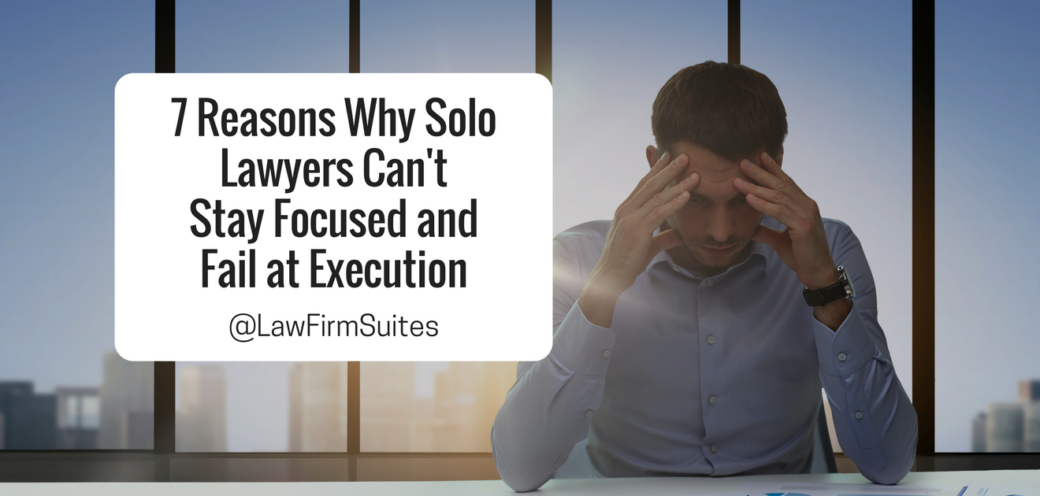Solo lawyers have a lot of responsibility, which if not handled properly can lead to several issues. Follow this article to learn why solo lawyers can’t stay focused and are poor at execution.
Being a solo lawyer comes with many responsibilities. You have to manage the day-to-day administrative and marketing tasks that keep your firm afloat, while still providing high-quality legal work to your clients.
A solo lawyer’s mind is always racing, with new ideas and currents tasks constantly clouding their thoughts. Because of this, solo lawyers can have a difficult time staying focused and completing each task they set out to do.
If you’re not careful and don’t take the right steps to improve both focus and execution, your practice will pay the price.
While not every solo lawyer faces these problems, it is still important to recognize the significance of the issues. Here are seven reasons why solo lawyers can’t stay focused and are poor at execution. Follow them and see you can improve your practice.
1. They avoid the things that make them frustrated
Being a solo lawyer requires you to be a marketer, sales person, and an office manager all in one. But law schools are typically not the best at teaching these additional necessary skills.
Because of this, lawyers tend to have more frustration towards those other tasks. But by avoiding frustrating things such as networking or social media marketing, you are putting your firm at a disadvantage. Instead, try to make a consistent effort to accomplish tasks that frustrate you. The more you do these, the less frustrating they will become, and you will be more inclined to do them in the future.
2. They neglect to create buckets
Solo lawyers will be more productive and focused if they organized their work into different “buckets.” Using buckets is a popular strategy where you divide all of your tasks into different categories. For example, you could have one bucket for client work, one for marketing and another for billing and admin work.
Instead of having one giant to-do list, you can categorize each item on the list. Then if you notice that certain buckets remain empty, or are getting more attention than others, then it’s time to shift your focus.
3. They don’t seek out help from their friends or colleagues
Contrary to how it sounds, going solo does not have to mean that you are completely alone. The practice of law is a very social experience and at some point, you WILL need to ask for help from both friends and other lawyers.
For example, if you are unsure about a specific aspect of a case, you could do one of two things. You could search aimlessly for the answer, or you could simply ask a colleague who might have some experience with this type of situation. It’s plain to see which option will help improve execution within your firm.
4. They don’t set deadlines
Being a solo lawyer means you are your own boss and you get to make the rules for your practice. But just because you are the boss doesn’t mean you are exempt from setting and meeting deadlines.
You might already have deadlines for client work but as a solo lawyer, you have to do more than just client work. Do you have deadlines for your marketing or admin tasks? Set due dates for everything, and stick to them.
5. They don’t find a niche
From time to time, you will receive referrals from friends and family members for a variety of legal issues, none of which fall into your actual practice area. It could be tempting to take on some of these cases primarily because you need the money, but that could do more harm than good.
By knowing your ideal client, it’s much easier to share that information with referral sources who in turn are able to send better quality referrals. Which will help you to focus on the specific cases that interest you and your firm.
6. They worry about what they can’t control
Worrying about things that are out of your control only leads to more issues. Instead, you need to put extra effort into all things you can control. By doing this, you can affect your firm as a whole, including those things you can’t directly influence.
For example, you can’t control how many new clients come in each month, but you can make sure you do everything within your power to generate new leads, thus affecting the amount of potential new clients. By taking this approach you are actively working to improve the things you can’t control.
7. They don’t clear their minds
Like all other professions, lawyers also need personal time, family time and physical activity. Getting away from work, and all the different tasks that come with it will help you to refocus and be more productive when you return. You’re not doing anyone any favors by overworking and burning yourself out.
Try setting aside time each day to exercise or to do something you enjoy. Making an effort to focus on you and your well-being will help you to lead a healthier, less stressful and more productive life.
In order to have a long and successful legal career, you will need to be both focused and productive. Use these tips to avoid things that will limit your ability to focus and execute tasks, and watch your solo law firm grow.


